Analysis of U.K. Counter-Terrorism Financial Legislation Impact
VerifiedAdded on 2022/08/23
|15
|3346
|17
Report
AI Summary
This report examines the impact of U.K. counter-terrorism financial legislation, focusing on its effectiveness in combating money laundering and terrorist financing. It analyzes key legislations, including the Terrorism Act 2000, Proceeds of Crime Act 2002, Money Laundering Regulations 2007, and the role of the European Union and the Financial Action Task Force (FATF). The report discusses the aims and objectives of these laws, their implementation, and their impact on financial institutions and individuals. It highlights the measures taken by the U.K. government, the role of FATF and EU directives, and the importance of suspicious activity reports. Furthermore, it explores the deficits and areas that need improvement in the current legal framework. The report provides a comprehensive overview of the U.K.'s efforts to counter terrorism through financial regulations and offers insights into the challenges and complexities of this ongoing effort.
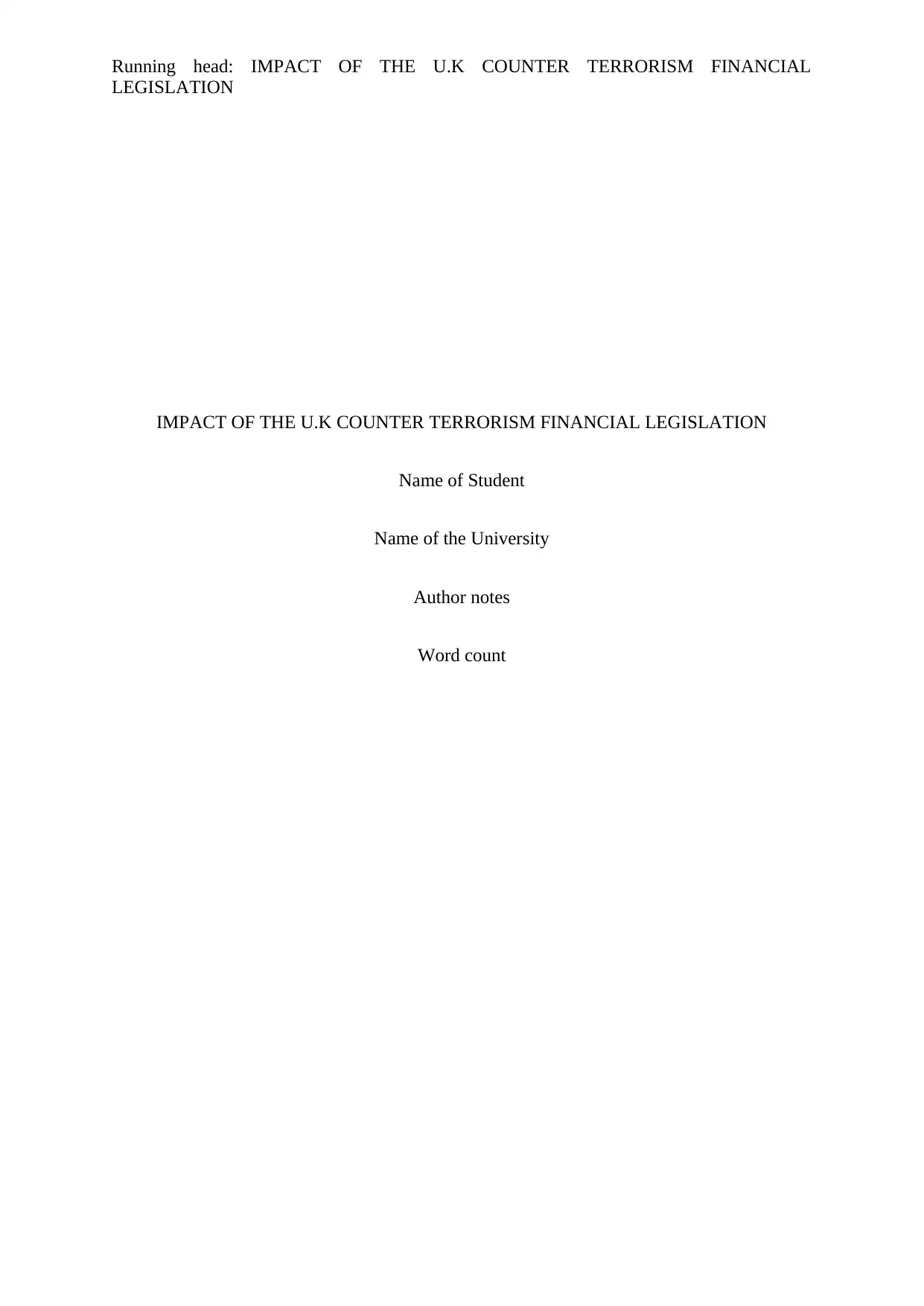
Running head: IMPACT OF THE U.K COUNTER TERRORISM FINANCIAL
LEGISLATION
IMPACT OF THE U.K COUNTER TERRORISM FINANCIAL LEGISLATION
Name of Student
Name of the University
Author notes
Word count
LEGISLATION
IMPACT OF THE U.K COUNTER TERRORISM FINANCIAL LEGISLATION
Name of Student
Name of the University
Author notes
Word count
Paraphrase This Document
Need a fresh take? Get an instant paraphrase of this document with our AI Paraphraser
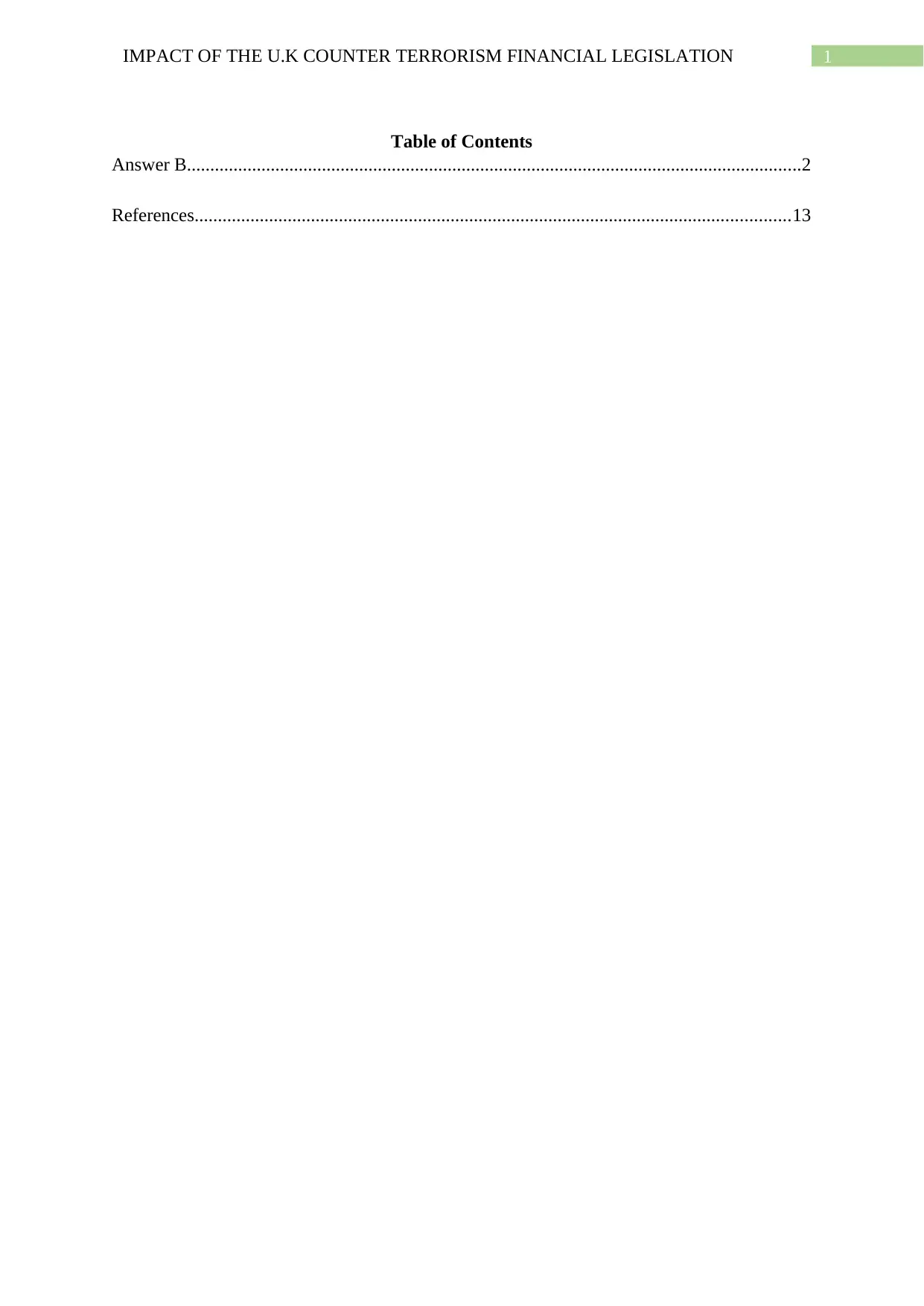
1IMPACT OF THE U.K COUNTER TERRORISM FINANCIAL LEGISLATION
Table of Contents
Answer B....................................................................................................................................2
References................................................................................................................................13
Table of Contents
Answer B....................................................................................................................................2
References................................................................................................................................13
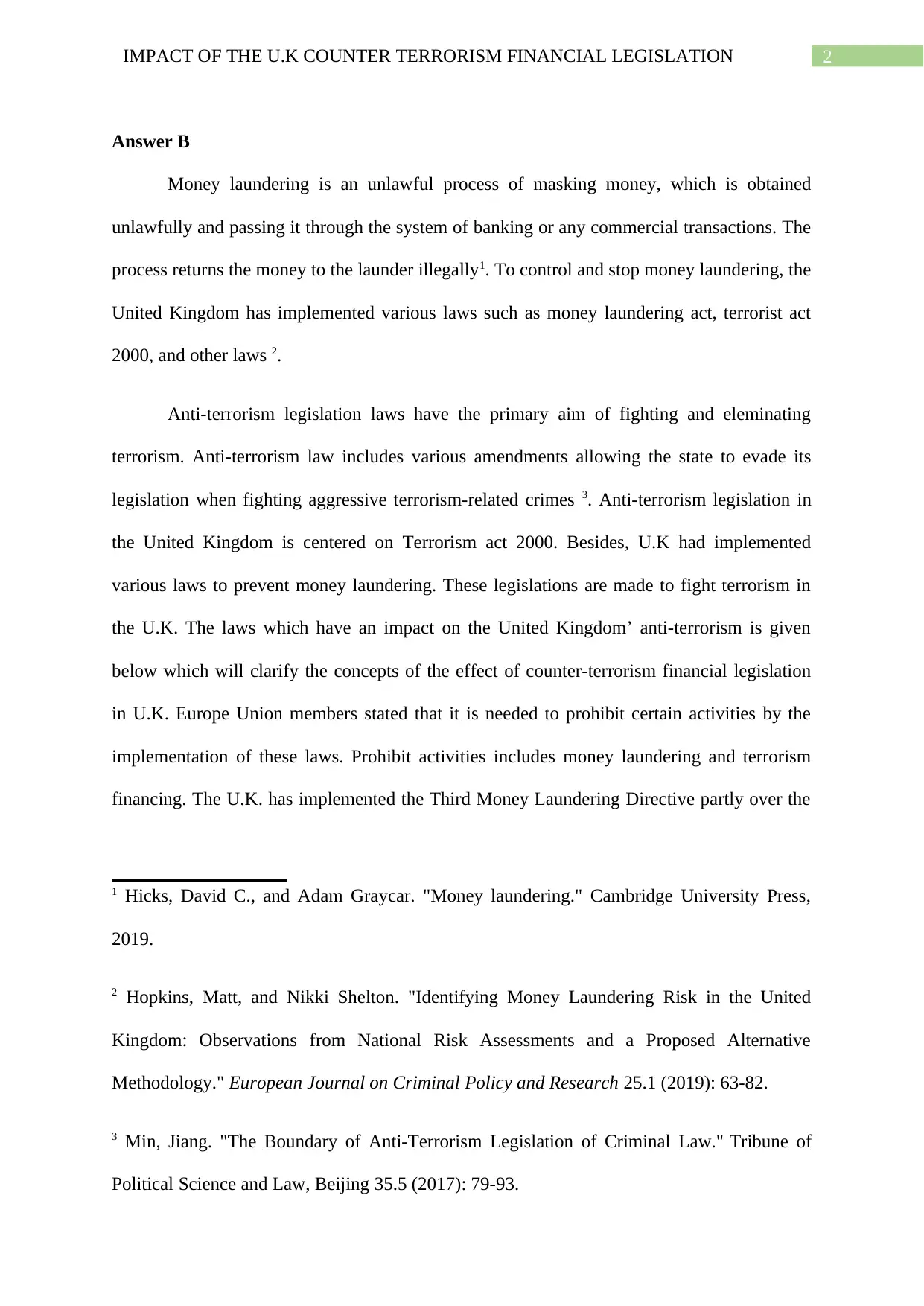
2IMPACT OF THE U.K COUNTER TERRORISM FINANCIAL LEGISLATION
Answer B
Money laundering is an unlawful process of masking money, which is obtained
unlawfully and passing it through the system of banking or any commercial transactions. The
process returns the money to the launder illegally1. To control and stop money laundering, the
United Kingdom has implemented various laws such as money laundering act, terrorist act
2000, and other laws 2.
Anti-terrorism legislation laws have the primary aim of fighting and eleminating
terrorism. Anti-terrorism law includes various amendments allowing the state to evade its
legislation when fighting aggressive terrorism-related crimes 3. Anti-terrorism legislation in
the United Kingdom is centered on Terrorism act 2000. Besides, U.K had implemented
various laws to prevent money laundering. These legislations are made to fight terrorism in
the U.K. The laws which have an impact on the United Kingdom’ anti-terrorism is given
below which will clarify the concepts of the effect of counter-terrorism financial legislation
in U.K. Europe Union members stated that it is needed to prohibit certain activities by the
implementation of these laws. Prohibit activities includes money laundering and terrorism
financing. The U.K. has implemented the Third Money Laundering Directive partly over the
1 Hicks, David C., and Adam Graycar. "Money laundering." Cambridge University Press,
2019.
2 Hopkins, Matt, and Nikki Shelton. "Identifying Money Laundering Risk in the United
Kingdom: Observations from National Risk Assessments and a Proposed Alternative
Methodology." European Journal on Criminal Policy and Research 25.1 (2019): 63-82.
3 Min, Jiang. "The Boundary of Anti-Terrorism Legislation of Criminal Law." Tribune of
Political Science and Law, Beijing 35.5 (2017): 79-93.
Answer B
Money laundering is an unlawful process of masking money, which is obtained
unlawfully and passing it through the system of banking or any commercial transactions. The
process returns the money to the launder illegally1. To control and stop money laundering, the
United Kingdom has implemented various laws such as money laundering act, terrorist act
2000, and other laws 2.
Anti-terrorism legislation laws have the primary aim of fighting and eleminating
terrorism. Anti-terrorism law includes various amendments allowing the state to evade its
legislation when fighting aggressive terrorism-related crimes 3. Anti-terrorism legislation in
the United Kingdom is centered on Terrorism act 2000. Besides, U.K had implemented
various laws to prevent money laundering. These legislations are made to fight terrorism in
the U.K. The laws which have an impact on the United Kingdom’ anti-terrorism is given
below which will clarify the concepts of the effect of counter-terrorism financial legislation
in U.K. Europe Union members stated that it is needed to prohibit certain activities by the
implementation of these laws. Prohibit activities includes money laundering and terrorism
financing. The U.K. has implemented the Third Money Laundering Directive partly over the
1 Hicks, David C., and Adam Graycar. "Money laundering." Cambridge University Press,
2019.
2 Hopkins, Matt, and Nikki Shelton. "Identifying Money Laundering Risk in the United
Kingdom: Observations from National Risk Assessments and a Proposed Alternative
Methodology." European Journal on Criminal Policy and Research 25.1 (2019): 63-82.
3 Min, Jiang. "The Boundary of Anti-Terrorism Legislation of Criminal Law." Tribune of
Political Science and Law, Beijing 35.5 (2017): 79-93.
⊘ This is a preview!⊘
Do you want full access?
Subscribe today to unlock all pages.

Trusted by 1+ million students worldwide
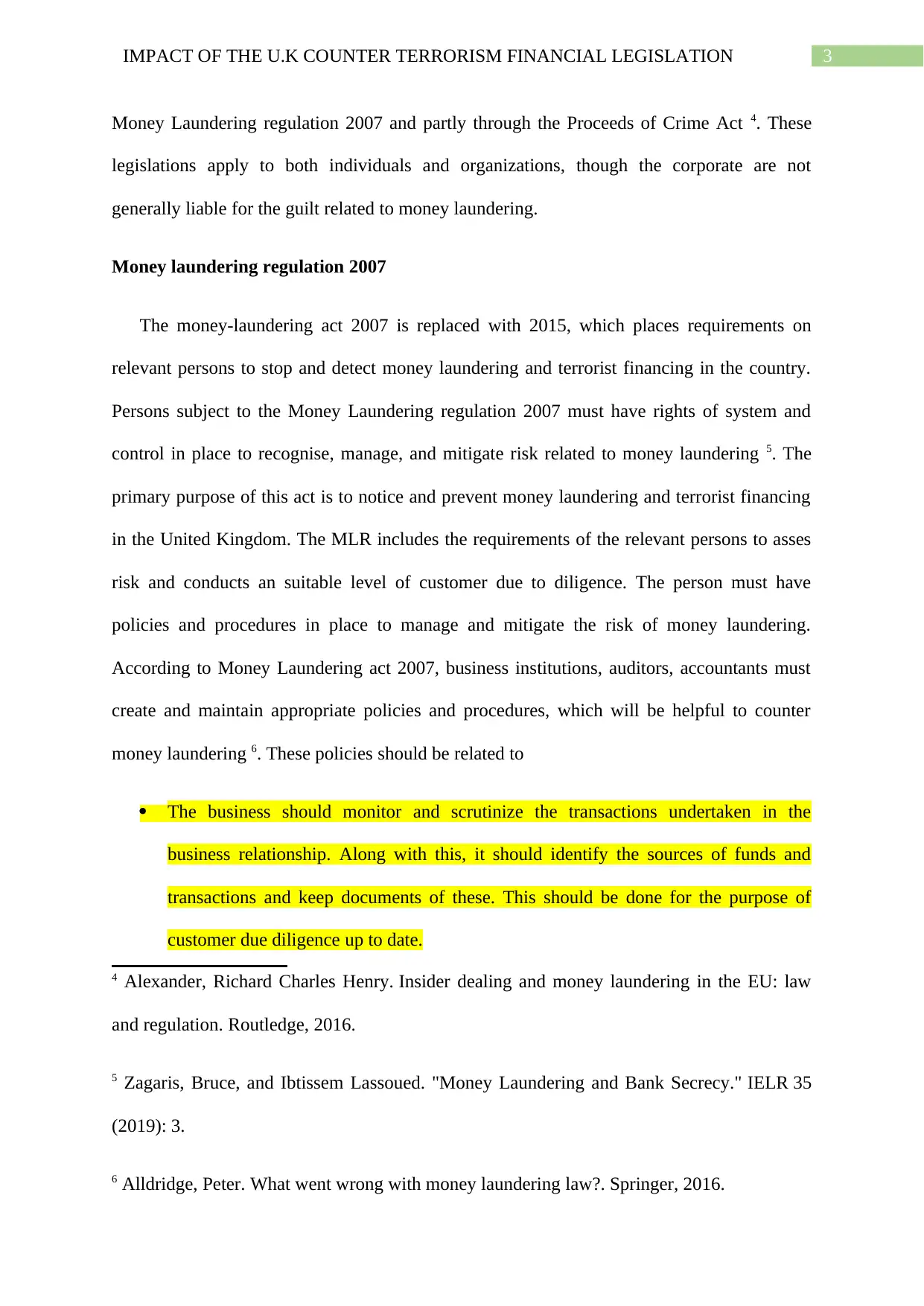
3IMPACT OF THE U.K COUNTER TERRORISM FINANCIAL LEGISLATION
Money Laundering regulation 2007 and partly through the Proceeds of Crime Act 4. These
legislations apply to both individuals and organizations, though the corporate are not
generally liable for the guilt related to money laundering.
Money laundering regulation 2007
The money-laundering act 2007 is replaced with 2015, which places requirements on
relevant persons to stop and detect money laundering and terrorist financing in the country.
Persons subject to the Money Laundering regulation 2007 must have rights of system and
control in place to recognise, manage, and mitigate risk related to money laundering 5. The
primary purpose of this act is to notice and prevent money laundering and terrorist financing
in the United Kingdom. The MLR includes the requirements of the relevant persons to asses
risk and conducts an suitable level of customer due to diligence. The person must have
policies and procedures in place to manage and mitigate the risk of money laundering.
According to Money Laundering act 2007, business institutions, auditors, accountants must
create and maintain appropriate policies and procedures, which will be helpful to counter
money laundering 6. These policies should be related to
The business should monitor and scrutinize the transactions undertaken in the
business relationship. Along with this, it should identify the sources of funds and
transactions and keep documents of these. This should be done for the purpose of
customer due diligence up to date.
4 Alexander, Richard Charles Henry. Insider dealing and money laundering in the EU: law
and regulation. Routledge, 2016.
5 Zagaris, Bruce, and Ibtissem Lassoued. "Money Laundering and Bank Secrecy." IELR 35
(2019): 3.
6 Alldridge, Peter. What went wrong with money laundering law?. Springer, 2016.
Money Laundering regulation 2007 and partly through the Proceeds of Crime Act 4. These
legislations apply to both individuals and organizations, though the corporate are not
generally liable for the guilt related to money laundering.
Money laundering regulation 2007
The money-laundering act 2007 is replaced with 2015, which places requirements on
relevant persons to stop and detect money laundering and terrorist financing in the country.
Persons subject to the Money Laundering regulation 2007 must have rights of system and
control in place to recognise, manage, and mitigate risk related to money laundering 5. The
primary purpose of this act is to notice and prevent money laundering and terrorist financing
in the United Kingdom. The MLR includes the requirements of the relevant persons to asses
risk and conducts an suitable level of customer due to diligence. The person must have
policies and procedures in place to manage and mitigate the risk of money laundering.
According to Money Laundering act 2007, business institutions, auditors, accountants must
create and maintain appropriate policies and procedures, which will be helpful to counter
money laundering 6. These policies should be related to
The business should monitor and scrutinize the transactions undertaken in the
business relationship. Along with this, it should identify the sources of funds and
transactions and keep documents of these. This should be done for the purpose of
customer due diligence up to date.
4 Alexander, Richard Charles Henry. Insider dealing and money laundering in the EU: law
and regulation. Routledge, 2016.
5 Zagaris, Bruce, and Ibtissem Lassoued. "Money Laundering and Bank Secrecy." IELR 35
(2019): 3.
6 Alldridge, Peter. What went wrong with money laundering law?. Springer, 2016.
Paraphrase This Document
Need a fresh take? Get an instant paraphrase of this document with our AI Paraphraser
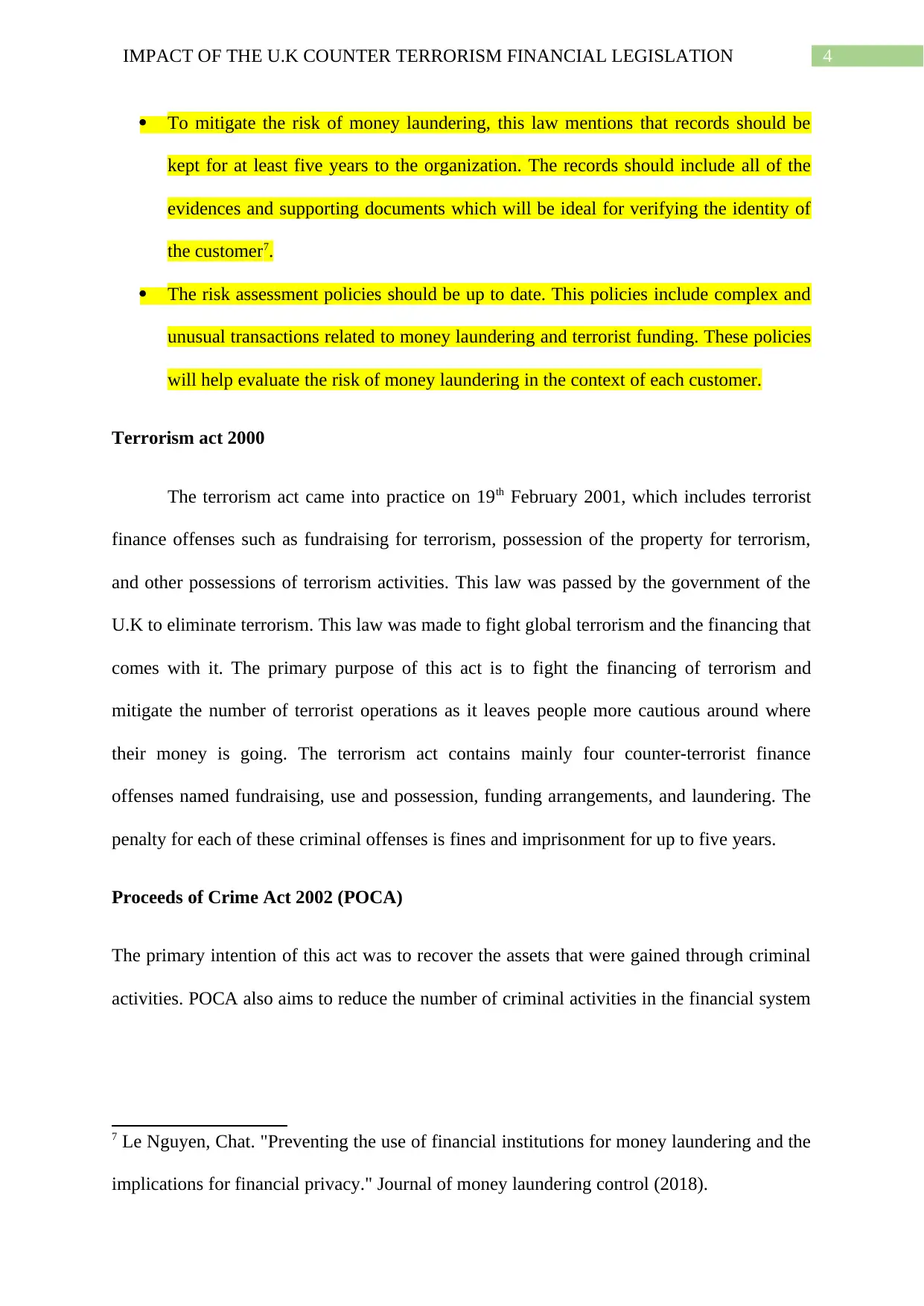
4IMPACT OF THE U.K COUNTER TERRORISM FINANCIAL LEGISLATION
To mitigate the risk of money laundering, this law mentions that records should be
kept for at least five years to the organization. The records should include all of the
evidences and supporting documents which will be ideal for verifying the identity of
the customer7.
The risk assessment policies should be up to date. This policies include complex and
unusual transactions related to money laundering and terrorist funding. These policies
will help evaluate the risk of money laundering in the context of each customer.
Terrorism act 2000
The terrorism act came into practice on 19th February 2001, which includes terrorist
finance offenses such as fundraising for terrorism, possession of the property for terrorism,
and other possessions of terrorism activities. This law was passed by the government of the
U.K to eliminate terrorism. This law was made to fight global terrorism and the financing that
comes with it. The primary purpose of this act is to fight the financing of terrorism and
mitigate the number of terrorist operations as it leaves people more cautious around where
their money is going. The terrorism act contains mainly four counter-terrorist finance
offenses named fundraising, use and possession, funding arrangements, and laundering. The
penalty for each of these criminal offenses is fines and imprisonment for up to five years.
Proceeds of Crime Act 2002 (POCA)
The primary intention of this act was to recover the assets that were gained through criminal
activities. POCA also aims to reduce the number of criminal activities in the financial system
7 Le Nguyen, Chat. "Preventing the use of financial institutions for money laundering and the
implications for financial privacy." Journal of money laundering control (2018).
To mitigate the risk of money laundering, this law mentions that records should be
kept for at least five years to the organization. The records should include all of the
evidences and supporting documents which will be ideal for verifying the identity of
the customer7.
The risk assessment policies should be up to date. This policies include complex and
unusual transactions related to money laundering and terrorist funding. These policies
will help evaluate the risk of money laundering in the context of each customer.
Terrorism act 2000
The terrorism act came into practice on 19th February 2001, which includes terrorist
finance offenses such as fundraising for terrorism, possession of the property for terrorism,
and other possessions of terrorism activities. This law was passed by the government of the
U.K to eliminate terrorism. This law was made to fight global terrorism and the financing that
comes with it. The primary purpose of this act is to fight the financing of terrorism and
mitigate the number of terrorist operations as it leaves people more cautious around where
their money is going. The terrorism act contains mainly four counter-terrorist finance
offenses named fundraising, use and possession, funding arrangements, and laundering. The
penalty for each of these criminal offenses is fines and imprisonment for up to five years.
Proceeds of Crime Act 2002 (POCA)
The primary intention of this act was to recover the assets that were gained through criminal
activities. POCA also aims to reduce the number of criminal activities in the financial system
7 Le Nguyen, Chat. "Preventing the use of financial institutions for money laundering and the
implications for financial privacy." Journal of money laundering control (2018).
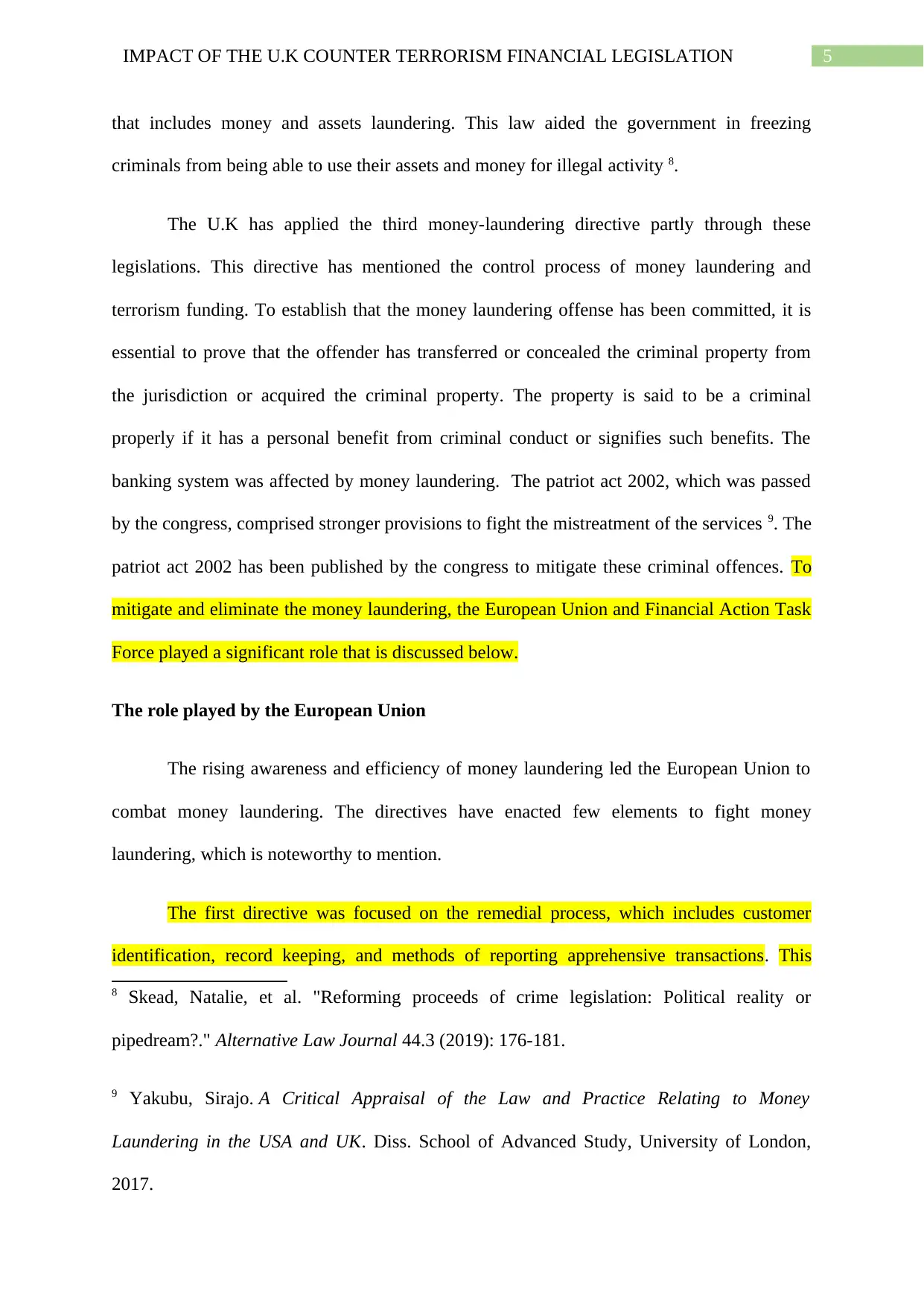
5IMPACT OF THE U.K COUNTER TERRORISM FINANCIAL LEGISLATION
that includes money and assets laundering. This law aided the government in freezing
criminals from being able to use their assets and money for illegal activity 8.
The U.K has applied the third money-laundering directive partly through these
legislations. This directive has mentioned the control process of money laundering and
terrorism funding. To establish that the money laundering offense has been committed, it is
essential to prove that the offender has transferred or concealed the criminal property from
the jurisdiction or acquired the criminal property. The property is said to be a criminal
properly if it has a personal benefit from criminal conduct or signifies such benefits. The
banking system was affected by money laundering. The patriot act 2002, which was passed
by the congress, comprised stronger provisions to fight the mistreatment of the services 9. The
patriot act 2002 has been published by the congress to mitigate these criminal offences. To
mitigate and eliminate the money laundering, the European Union and Financial Action Task
Force played a significant role that is discussed below.
The role played by the European Union
The rising awareness and efficiency of money laundering led the European Union to
combat money laundering. The directives have enacted few elements to fight money
laundering, which is noteworthy to mention.
The first directive was focused on the remedial process, which includes customer
identification, record keeping, and methods of reporting apprehensive transactions. This
8 Skead, Natalie, et al. "Reforming proceeds of crime legislation: Political reality or
pipedream?." Alternative Law Journal 44.3 (2019): 176-181.
9 Yakubu, Sirajo. A Critical Appraisal of the Law and Practice Relating to Money
Laundering in the USA and UK. Diss. School of Advanced Study, University of London,
2017.
that includes money and assets laundering. This law aided the government in freezing
criminals from being able to use their assets and money for illegal activity 8.
The U.K has applied the third money-laundering directive partly through these
legislations. This directive has mentioned the control process of money laundering and
terrorism funding. To establish that the money laundering offense has been committed, it is
essential to prove that the offender has transferred or concealed the criminal property from
the jurisdiction or acquired the criminal property. The property is said to be a criminal
properly if it has a personal benefit from criminal conduct or signifies such benefits. The
banking system was affected by money laundering. The patriot act 2002, which was passed
by the congress, comprised stronger provisions to fight the mistreatment of the services 9. The
patriot act 2002 has been published by the congress to mitigate these criminal offences. To
mitigate and eliminate the money laundering, the European Union and Financial Action Task
Force played a significant role that is discussed below.
The role played by the European Union
The rising awareness and efficiency of money laundering led the European Union to
combat money laundering. The directives have enacted few elements to fight money
laundering, which is noteworthy to mention.
The first directive was focused on the remedial process, which includes customer
identification, record keeping, and methods of reporting apprehensive transactions. This
8 Skead, Natalie, et al. "Reforming proceeds of crime legislation: Political reality or
pipedream?." Alternative Law Journal 44.3 (2019): 176-181.
9 Yakubu, Sirajo. A Critical Appraisal of the Law and Practice Relating to Money
Laundering in the USA and UK. Diss. School of Advanced Study, University of London,
2017.
⊘ This is a preview!⊘
Do you want full access?
Subscribe today to unlock all pages.

Trusted by 1+ million students worldwide
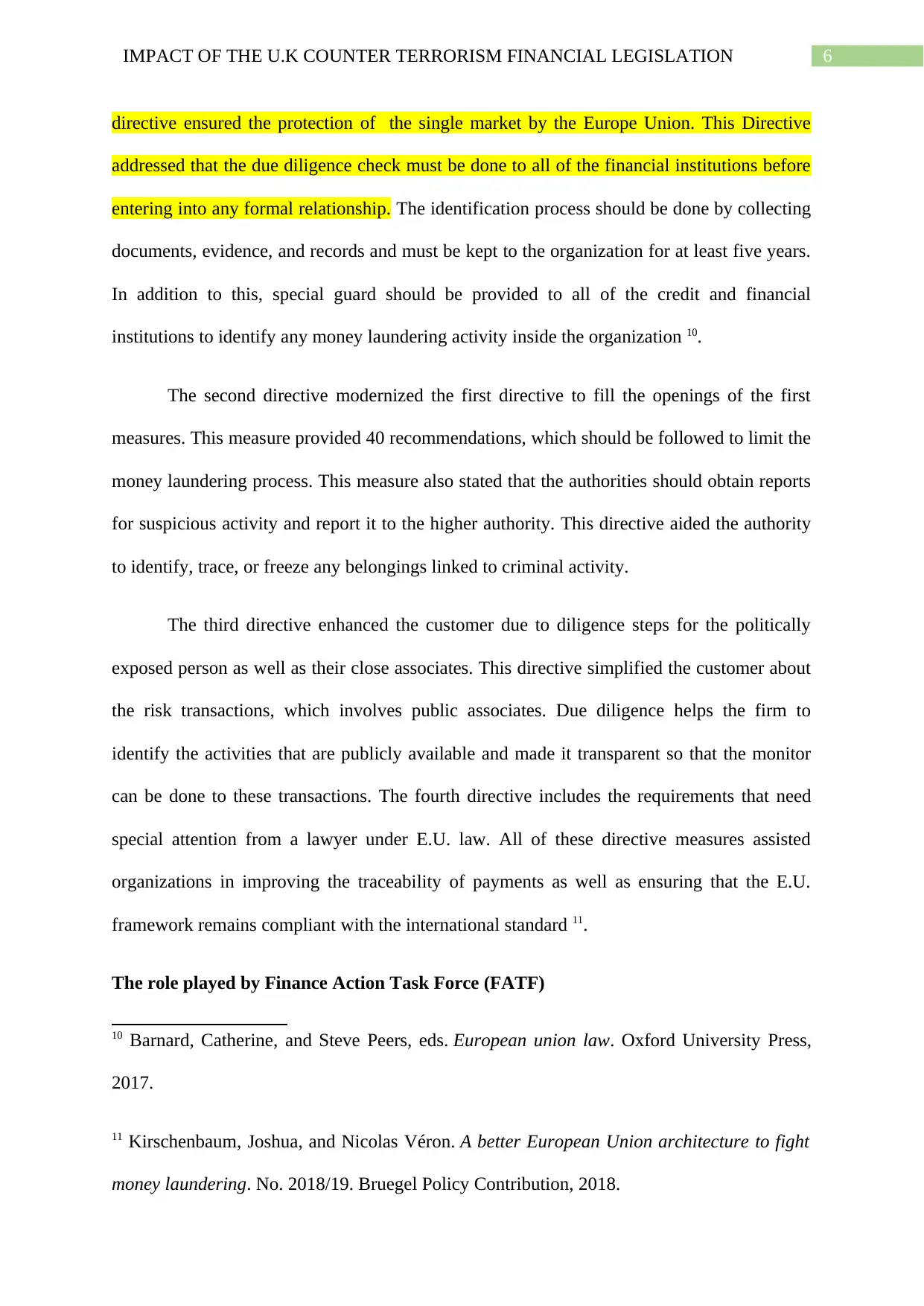
6IMPACT OF THE U.K COUNTER TERRORISM FINANCIAL LEGISLATION
directive ensured the protection of the single market by the Europe Union. This Directive
addressed that the due diligence check must be done to all of the financial institutions before
entering into any formal relationship. The identification process should be done by collecting
documents, evidence, and records and must be kept to the organization for at least five years.
In addition to this, special guard should be provided to all of the credit and financial
institutions to identify any money laundering activity inside the organization 10.
The second directive modernized the first directive to fill the openings of the first
measures. This measure provided 40 recommendations, which should be followed to limit the
money laundering process. This measure also stated that the authorities should obtain reports
for suspicious activity and report it to the higher authority. This directive aided the authority
to identify, trace, or freeze any belongings linked to criminal activity.
The third directive enhanced the customer due to diligence steps for the politically
exposed person as well as their close associates. This directive simplified the customer about
the risk transactions, which involves public associates. Due diligence helps the firm to
identify the activities that are publicly available and made it transparent so that the monitor
can be done to these transactions. The fourth directive includes the requirements that need
special attention from a lawyer under E.U. law. All of these directive measures assisted
organizations in improving the traceability of payments as well as ensuring that the E.U.
framework remains compliant with the international standard 11.
The role played by Finance Action Task Force (FATF)
10 Barnard, Catherine, and Steve Peers, eds. European union law. Oxford University Press,
2017.
11 Kirschenbaum, Joshua, and Nicolas Véron. A better European Union architecture to fight
money laundering. No. 2018/19. Bruegel Policy Contribution, 2018.
directive ensured the protection of the single market by the Europe Union. This Directive
addressed that the due diligence check must be done to all of the financial institutions before
entering into any formal relationship. The identification process should be done by collecting
documents, evidence, and records and must be kept to the organization for at least five years.
In addition to this, special guard should be provided to all of the credit and financial
institutions to identify any money laundering activity inside the organization 10.
The second directive modernized the first directive to fill the openings of the first
measures. This measure provided 40 recommendations, which should be followed to limit the
money laundering process. This measure also stated that the authorities should obtain reports
for suspicious activity and report it to the higher authority. This directive aided the authority
to identify, trace, or freeze any belongings linked to criminal activity.
The third directive enhanced the customer due to diligence steps for the politically
exposed person as well as their close associates. This directive simplified the customer about
the risk transactions, which involves public associates. Due diligence helps the firm to
identify the activities that are publicly available and made it transparent so that the monitor
can be done to these transactions. The fourth directive includes the requirements that need
special attention from a lawyer under E.U. law. All of these directive measures assisted
organizations in improving the traceability of payments as well as ensuring that the E.U.
framework remains compliant with the international standard 11.
The role played by Finance Action Task Force (FATF)
10 Barnard, Catherine, and Steve Peers, eds. European union law. Oxford University Press,
2017.
11 Kirschenbaum, Joshua, and Nicolas Véron. A better European Union architecture to fight
money laundering. No. 2018/19. Bruegel Policy Contribution, 2018.
Paraphrase This Document
Need a fresh take? Get an instant paraphrase of this document with our AI Paraphraser
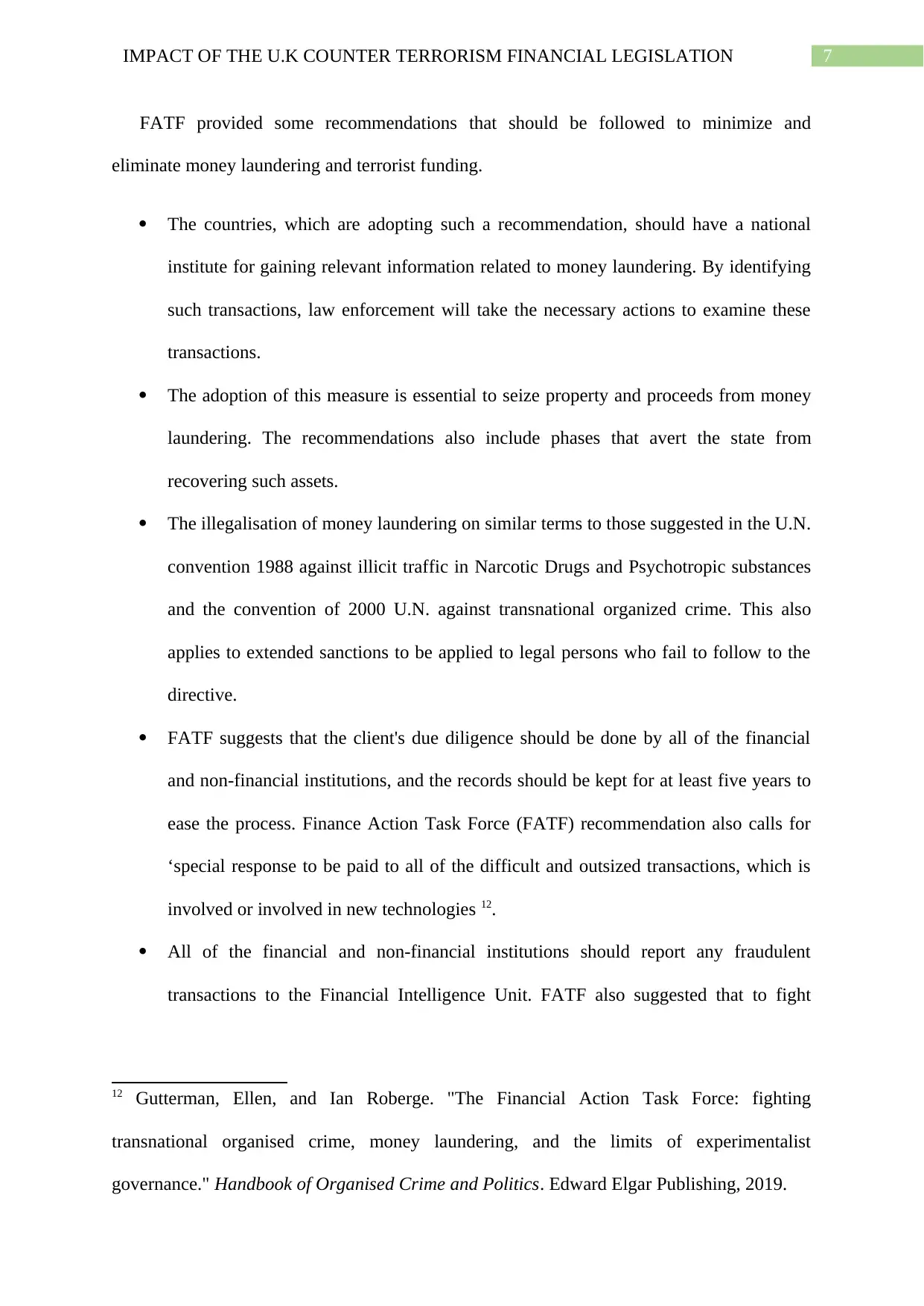
7IMPACT OF THE U.K COUNTER TERRORISM FINANCIAL LEGISLATION
FATF provided some recommendations that should be followed to minimize and
eliminate money laundering and terrorist funding.
The countries, which are adopting such a recommendation, should have a national
institute for gaining relevant information related to money laundering. By identifying
such transactions, law enforcement will take the necessary actions to examine these
transactions.
The adoption of this measure is essential to seize property and proceeds from money
laundering. The recommendations also include phases that avert the state from
recovering such assets.
The illegalisation of money laundering on similar terms to those suggested in the U.N.
convention 1988 against illicit traffic in Narcotic Drugs and Psychotropic substances
and the convention of 2000 U.N. against transnational organized crime. This also
applies to extended sanctions to be applied to legal persons who fail to follow to the
directive.
FATF suggests that the client's due diligence should be done by all of the financial
and non-financial institutions, and the records should be kept for at least five years to
ease the process. Finance Action Task Force (FATF) recommendation also calls for
‘special response to be paid to all of the difficult and outsized transactions, which is
involved or involved in new technologies 12.
All of the financial and non-financial institutions should report any fraudulent
transactions to the Financial Intelligence Unit. FATF also suggested that to fight
12 Gutterman, Ellen, and Ian Roberge. "The Financial Action Task Force: fighting
transnational organised crime, money laundering, and the limits of experimentalist
governance." Handbook of Organised Crime and Politics. Edward Elgar Publishing, 2019.
FATF provided some recommendations that should be followed to minimize and
eliminate money laundering and terrorist funding.
The countries, which are adopting such a recommendation, should have a national
institute for gaining relevant information related to money laundering. By identifying
such transactions, law enforcement will take the necessary actions to examine these
transactions.
The adoption of this measure is essential to seize property and proceeds from money
laundering. The recommendations also include phases that avert the state from
recovering such assets.
The illegalisation of money laundering on similar terms to those suggested in the U.N.
convention 1988 against illicit traffic in Narcotic Drugs and Psychotropic substances
and the convention of 2000 U.N. against transnational organized crime. This also
applies to extended sanctions to be applied to legal persons who fail to follow to the
directive.
FATF suggests that the client's due diligence should be done by all of the financial
and non-financial institutions, and the records should be kept for at least five years to
ease the process. Finance Action Task Force (FATF) recommendation also calls for
‘special response to be paid to all of the difficult and outsized transactions, which is
involved or involved in new technologies 12.
All of the financial and non-financial institutions should report any fraudulent
transactions to the Financial Intelligence Unit. FATF also suggested that to fight
12 Gutterman, Ellen, and Ian Roberge. "The Financial Action Task Force: fighting
transnational organised crime, money laundering, and the limits of experimentalist
governance." Handbook of Organised Crime and Politics. Edward Elgar Publishing, 2019.
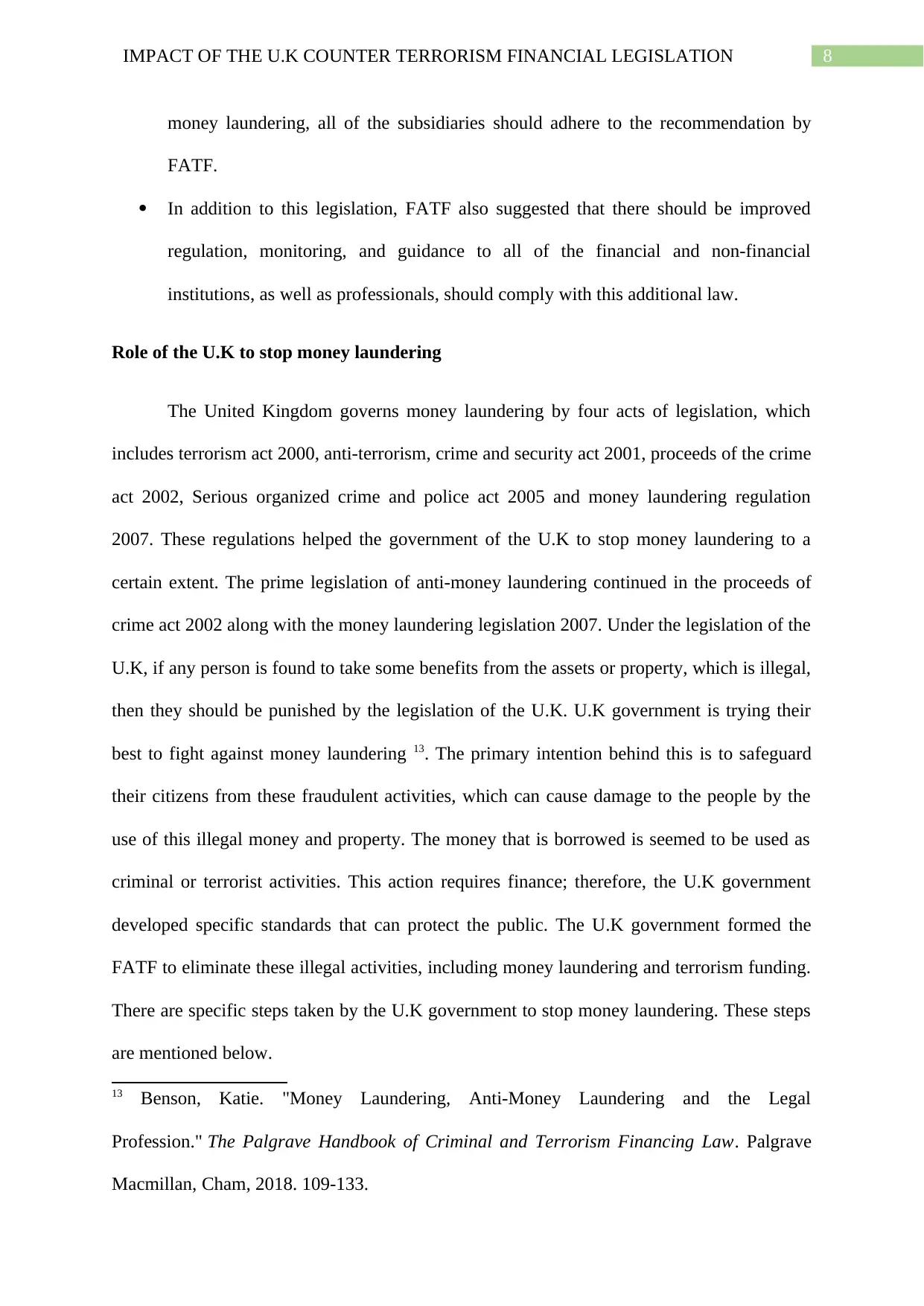
8IMPACT OF THE U.K COUNTER TERRORISM FINANCIAL LEGISLATION
money laundering, all of the subsidiaries should adhere to the recommendation by
FATF.
In addition to this legislation, FATF also suggested that there should be improved
regulation, monitoring, and guidance to all of the financial and non-financial
institutions, as well as professionals, should comply with this additional law.
Role of the U.K to stop money laundering
The United Kingdom governs money laundering by four acts of legislation, which
includes terrorism act 2000, anti-terrorism, crime and security act 2001, proceeds of the crime
act 2002, Serious organized crime and police act 2005 and money laundering regulation
2007. These regulations helped the government of the U.K to stop money laundering to a
certain extent. The prime legislation of anti-money laundering continued in the proceeds of
crime act 2002 along with the money laundering legislation 2007. Under the legislation of the
U.K, if any person is found to take some benefits from the assets or property, which is illegal,
then they should be punished by the legislation of the U.K. U.K government is trying their
best to fight against money laundering 13. The primary intention behind this is to safeguard
their citizens from these fraudulent activities, which can cause damage to the people by the
use of this illegal money and property. The money that is borrowed is seemed to be used as
criminal or terrorist activities. This action requires finance; therefore, the U.K government
developed specific standards that can protect the public. The U.K government formed the
FATF to eliminate these illegal activities, including money laundering and terrorism funding.
There are specific steps taken by the U.K government to stop money laundering. These steps
are mentioned below.
13 Benson, Katie. "Money Laundering, Anti-Money Laundering and the Legal
Profession." The Palgrave Handbook of Criminal and Terrorism Financing Law. Palgrave
Macmillan, Cham, 2018. 109-133.
money laundering, all of the subsidiaries should adhere to the recommendation by
FATF.
In addition to this legislation, FATF also suggested that there should be improved
regulation, monitoring, and guidance to all of the financial and non-financial
institutions, as well as professionals, should comply with this additional law.
Role of the U.K to stop money laundering
The United Kingdom governs money laundering by four acts of legislation, which
includes terrorism act 2000, anti-terrorism, crime and security act 2001, proceeds of the crime
act 2002, Serious organized crime and police act 2005 and money laundering regulation
2007. These regulations helped the government of the U.K to stop money laundering to a
certain extent. The prime legislation of anti-money laundering continued in the proceeds of
crime act 2002 along with the money laundering legislation 2007. Under the legislation of the
U.K, if any person is found to take some benefits from the assets or property, which is illegal,
then they should be punished by the legislation of the U.K. U.K government is trying their
best to fight against money laundering 13. The primary intention behind this is to safeguard
their citizens from these fraudulent activities, which can cause damage to the people by the
use of this illegal money and property. The money that is borrowed is seemed to be used as
criminal or terrorist activities. This action requires finance; therefore, the U.K government
developed specific standards that can protect the public. The U.K government formed the
FATF to eliminate these illegal activities, including money laundering and terrorism funding.
There are specific steps taken by the U.K government to stop money laundering. These steps
are mentioned below.
13 Benson, Katie. "Money Laundering, Anti-Money Laundering and the Legal
Profession." The Palgrave Handbook of Criminal and Terrorism Financing Law. Palgrave
Macmillan, Cham, 2018. 109-133.
⊘ This is a preview!⊘
Do you want full access?
Subscribe today to unlock all pages.

Trusted by 1+ million students worldwide
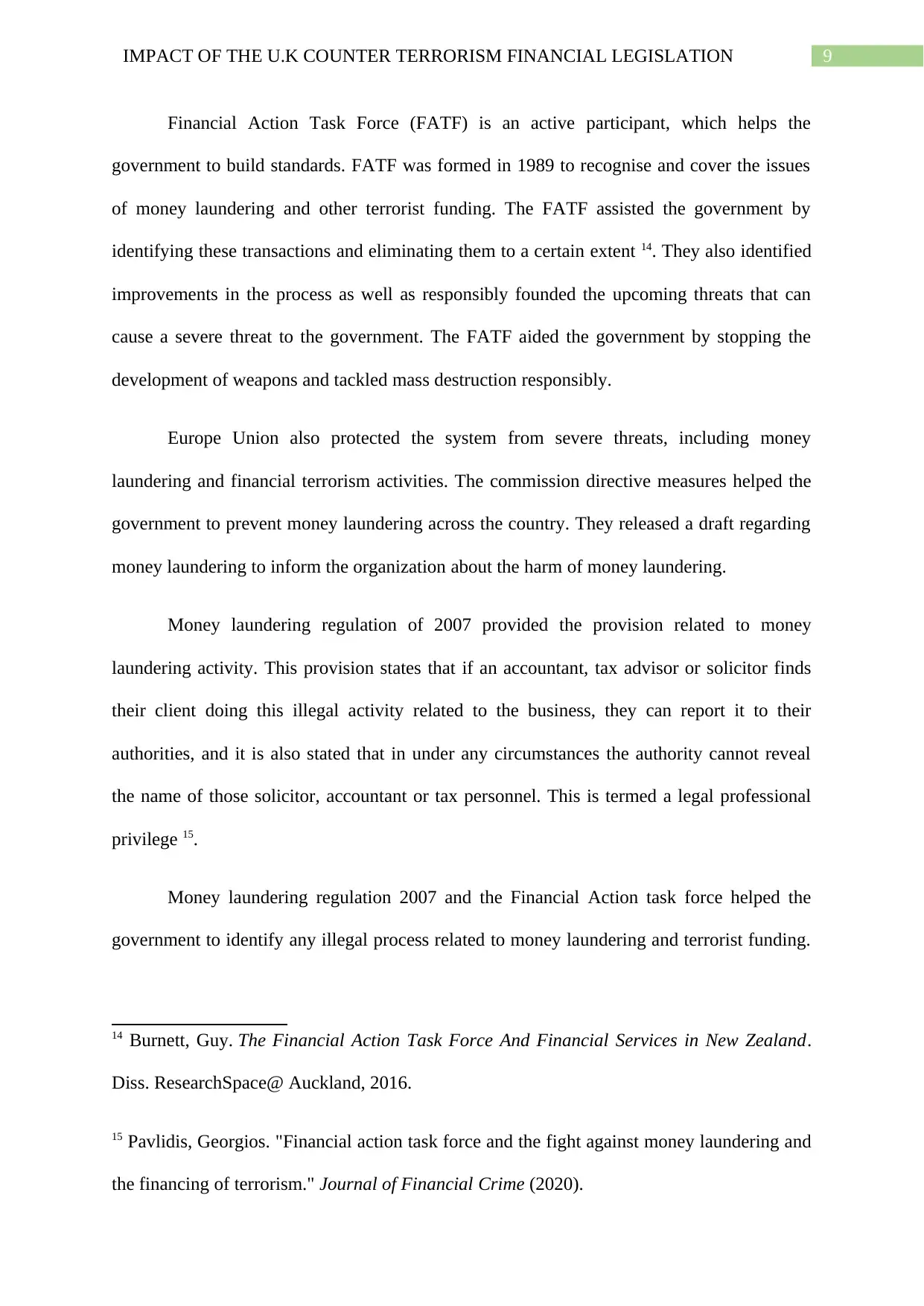
9IMPACT OF THE U.K COUNTER TERRORISM FINANCIAL LEGISLATION
Financial Action Task Force (FATF) is an active participant, which helps the
government to build standards. FATF was formed in 1989 to recognise and cover the issues
of money laundering and other terrorist funding. The FATF assisted the government by
identifying these transactions and eliminating them to a certain extent 14. They also identified
improvements in the process as well as responsibly founded the upcoming threats that can
cause a severe threat to the government. The FATF aided the government by stopping the
development of weapons and tackled mass destruction responsibly.
Europe Union also protected the system from severe threats, including money
laundering and financial terrorism activities. The commission directive measures helped the
government to prevent money laundering across the country. They released a draft regarding
money laundering to inform the organization about the harm of money laundering.
Money laundering regulation of 2007 provided the provision related to money
laundering activity. This provision states that if an accountant, tax advisor or solicitor finds
their client doing this illegal activity related to the business, they can report it to their
authorities, and it is also stated that in under any circumstances the authority cannot reveal
the name of those solicitor, accountant or tax personnel. This is termed a legal professional
privilege 15.
Money laundering regulation 2007 and the Financial Action task force helped the
government to identify any illegal process related to money laundering and terrorist funding.
14 Burnett, Guy. The Financial Action Task Force And Financial Services in New Zealand.
Diss. ResearchSpace@ Auckland, 2016.
15 Pavlidis, Georgios. "Financial action task force and the fight against money laundering and
the financing of terrorism." Journal of Financial Crime (2020).
Financial Action Task Force (FATF) is an active participant, which helps the
government to build standards. FATF was formed in 1989 to recognise and cover the issues
of money laundering and other terrorist funding. The FATF assisted the government by
identifying these transactions and eliminating them to a certain extent 14. They also identified
improvements in the process as well as responsibly founded the upcoming threats that can
cause a severe threat to the government. The FATF aided the government by stopping the
development of weapons and tackled mass destruction responsibly.
Europe Union also protected the system from severe threats, including money
laundering and financial terrorism activities. The commission directive measures helped the
government to prevent money laundering across the country. They released a draft regarding
money laundering to inform the organization about the harm of money laundering.
Money laundering regulation of 2007 provided the provision related to money
laundering activity. This provision states that if an accountant, tax advisor or solicitor finds
their client doing this illegal activity related to the business, they can report it to their
authorities, and it is also stated that in under any circumstances the authority cannot reveal
the name of those solicitor, accountant or tax personnel. This is termed a legal professional
privilege 15.
Money laundering regulation 2007 and the Financial Action task force helped the
government to identify any illegal process related to money laundering and terrorist funding.
14 Burnett, Guy. The Financial Action Task Force And Financial Services in New Zealand.
Diss. ResearchSpace@ Auckland, 2016.
15 Pavlidis, Georgios. "Financial action task force and the fight against money laundering and
the financing of terrorism." Journal of Financial Crime (2020).
Paraphrase This Document
Need a fresh take? Get an instant paraphrase of this document with our AI Paraphraser
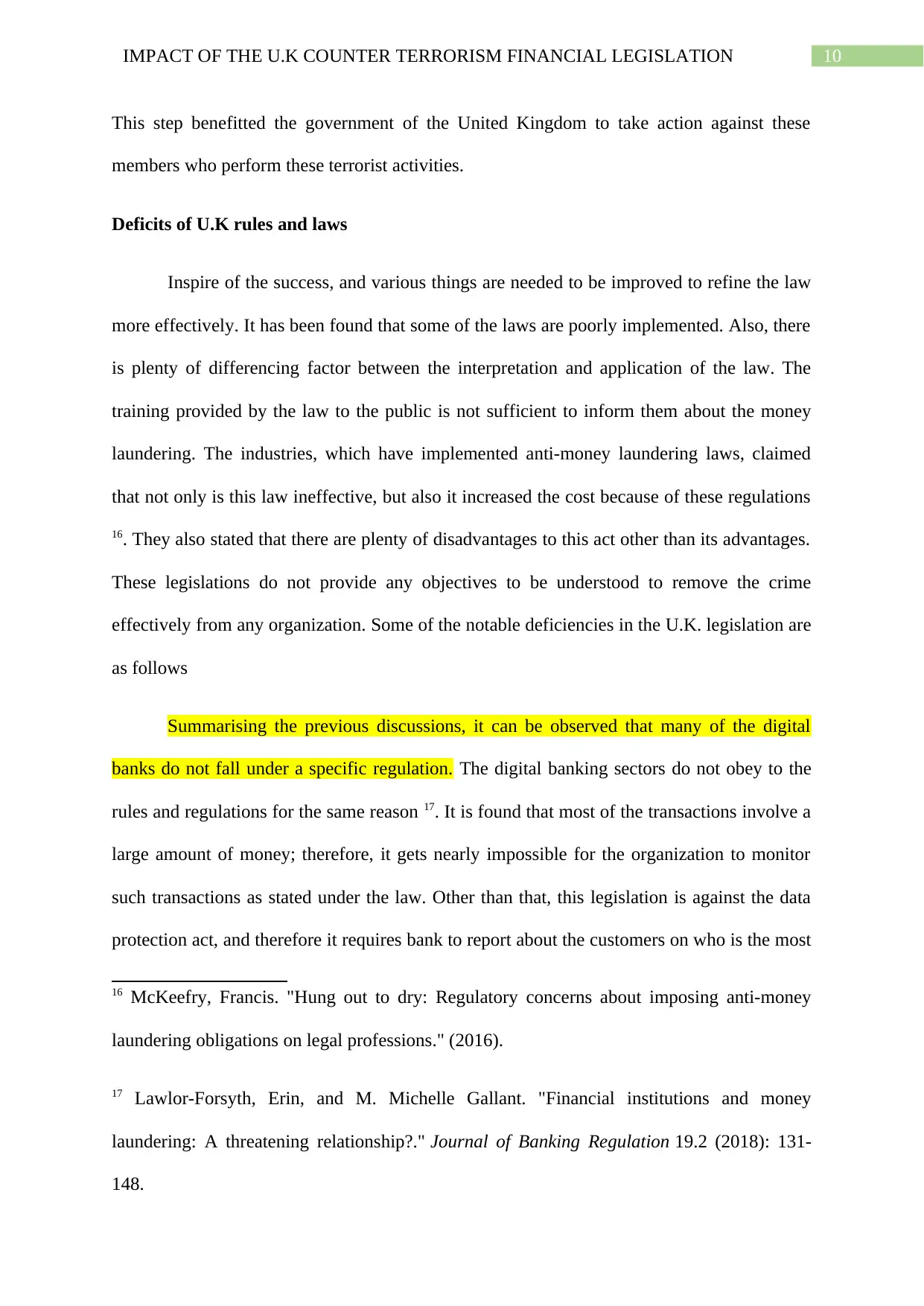
10IMPACT OF THE U.K COUNTER TERRORISM FINANCIAL LEGISLATION
This step benefitted the government of the United Kingdom to take action against these
members who perform these terrorist activities.
Deficits of U.K rules and laws
Inspire of the success, and various things are needed to be improved to refine the law
more effectively. It has been found that some of the laws are poorly implemented. Also, there
is plenty of differencing factor between the interpretation and application of the law. The
training provided by the law to the public is not sufficient to inform them about the money
laundering. The industries, which have implemented anti-money laundering laws, claimed
that not only is this law ineffective, but also it increased the cost because of these regulations
16. They also stated that there are plenty of disadvantages to this act other than its advantages.
These legislations do not provide any objectives to be understood to remove the crime
effectively from any organization. Some of the notable deficiencies in the U.K. legislation are
as follows
Summarising the previous discussions, it can be observed that many of the digital
banks do not fall under a specific regulation. The digital banking sectors do not obey to the
rules and regulations for the same reason 17. It is found that most of the transactions involve a
large amount of money; therefore, it gets nearly impossible for the organization to monitor
such transactions as stated under the law. Other than that, this legislation is against the data
protection act, and therefore it requires bank to report about the customers on who is the most
16 McKeefry, Francis. "Hung out to dry: Regulatory concerns about imposing anti-money
laundering obligations on legal professions." (2016).
17 Lawlor-Forsyth, Erin, and M. Michelle Gallant. "Financial institutions and money
laundering: A threatening relationship?." Journal of Banking Regulation 19.2 (2018): 131-
148.
This step benefitted the government of the United Kingdom to take action against these
members who perform these terrorist activities.
Deficits of U.K rules and laws
Inspire of the success, and various things are needed to be improved to refine the law
more effectively. It has been found that some of the laws are poorly implemented. Also, there
is plenty of differencing factor between the interpretation and application of the law. The
training provided by the law to the public is not sufficient to inform them about the money
laundering. The industries, which have implemented anti-money laundering laws, claimed
that not only is this law ineffective, but also it increased the cost because of these regulations
16. They also stated that there are plenty of disadvantages to this act other than its advantages.
These legislations do not provide any objectives to be understood to remove the crime
effectively from any organization. Some of the notable deficiencies in the U.K. legislation are
as follows
Summarising the previous discussions, it can be observed that many of the digital
banks do not fall under a specific regulation. The digital banking sectors do not obey to the
rules and regulations for the same reason 17. It is found that most of the transactions involve a
large amount of money; therefore, it gets nearly impossible for the organization to monitor
such transactions as stated under the law. Other than that, this legislation is against the data
protection act, and therefore it requires bank to report about the customers on who is the most
16 McKeefry, Francis. "Hung out to dry: Regulatory concerns about imposing anti-money
laundering obligations on legal professions." (2016).
17 Lawlor-Forsyth, Erin, and M. Michelle Gallant. "Financial institutions and money
laundering: A threatening relationship?." Journal of Banking Regulation 19.2 (2018): 131-
148.
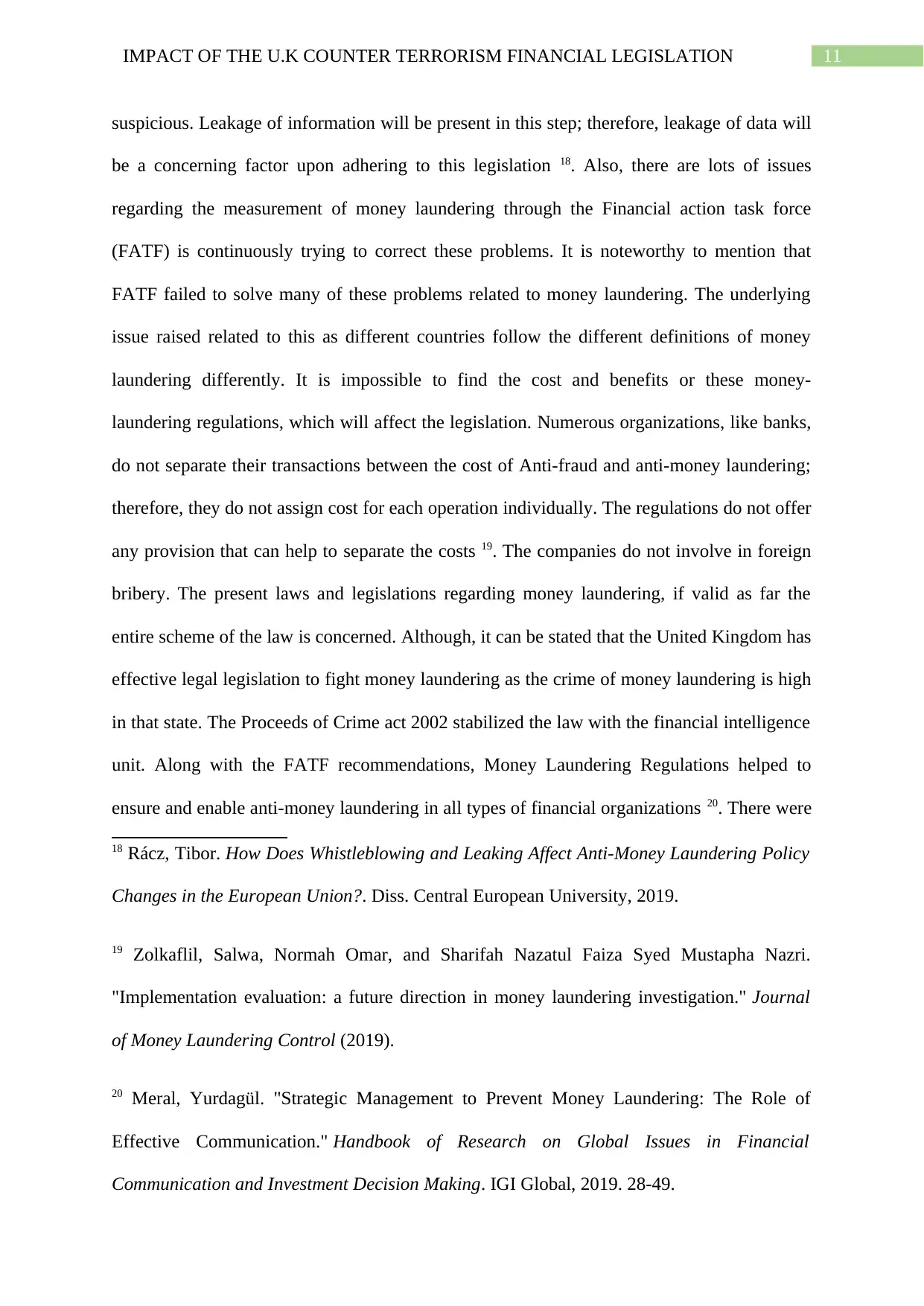
11IMPACT OF THE U.K COUNTER TERRORISM FINANCIAL LEGISLATION
suspicious. Leakage of information will be present in this step; therefore, leakage of data will
be a concerning factor upon adhering to this legislation 18. Also, there are lots of issues
regarding the measurement of money laundering through the Financial action task force
(FATF) is continuously trying to correct these problems. It is noteworthy to mention that
FATF failed to solve many of these problems related to money laundering. The underlying
issue raised related to this as different countries follow the different definitions of money
laundering differently. It is impossible to find the cost and benefits or these money-
laundering regulations, which will affect the legislation. Numerous organizations, like banks,
do not separate their transactions between the cost of Anti-fraud and anti-money laundering;
therefore, they do not assign cost for each operation individually. The regulations do not offer
any provision that can help to separate the costs 19. The companies do not involve in foreign
bribery. The present laws and legislations regarding money laundering, if valid as far the
entire scheme of the law is concerned. Although, it can be stated that the United Kingdom has
effective legal legislation to fight money laundering as the crime of money laundering is high
in that state. The Proceeds of Crime act 2002 stabilized the law with the financial intelligence
unit. Along with the FATF recommendations, Money Laundering Regulations helped to
ensure and enable anti-money laundering in all types of financial organizations 20. There were
18 Rácz, Tibor. How Does Whistleblowing and Leaking Affect Anti-Money Laundering Policy
Changes in the European Union?. Diss. Central European University, 2019.
19 Zolkaflil, Salwa, Normah Omar, and Sharifah Nazatul Faiza Syed Mustapha Nazri.
"Implementation evaluation: a future direction in money laundering investigation." Journal
of Money Laundering Control (2019).
20 Meral, Yurdagül. "Strategic Management to Prevent Money Laundering: The Role of
Effective Communication." Handbook of Research on Global Issues in Financial
Communication and Investment Decision Making. IGI Global, 2019. 28-49.
suspicious. Leakage of information will be present in this step; therefore, leakage of data will
be a concerning factor upon adhering to this legislation 18. Also, there are lots of issues
regarding the measurement of money laundering through the Financial action task force
(FATF) is continuously trying to correct these problems. It is noteworthy to mention that
FATF failed to solve many of these problems related to money laundering. The underlying
issue raised related to this as different countries follow the different definitions of money
laundering differently. It is impossible to find the cost and benefits or these money-
laundering regulations, which will affect the legislation. Numerous organizations, like banks,
do not separate their transactions between the cost of Anti-fraud and anti-money laundering;
therefore, they do not assign cost for each operation individually. The regulations do not offer
any provision that can help to separate the costs 19. The companies do not involve in foreign
bribery. The present laws and legislations regarding money laundering, if valid as far the
entire scheme of the law is concerned. Although, it can be stated that the United Kingdom has
effective legal legislation to fight money laundering as the crime of money laundering is high
in that state. The Proceeds of Crime act 2002 stabilized the law with the financial intelligence
unit. Along with the FATF recommendations, Money Laundering Regulations helped to
ensure and enable anti-money laundering in all types of financial organizations 20. There were
18 Rácz, Tibor. How Does Whistleblowing and Leaking Affect Anti-Money Laundering Policy
Changes in the European Union?. Diss. Central European University, 2019.
19 Zolkaflil, Salwa, Normah Omar, and Sharifah Nazatul Faiza Syed Mustapha Nazri.
"Implementation evaluation: a future direction in money laundering investigation." Journal
of Money Laundering Control (2019).
20 Meral, Yurdagül. "Strategic Management to Prevent Money Laundering: The Role of
Effective Communication." Handbook of Research on Global Issues in Financial
Communication and Investment Decision Making. IGI Global, 2019. 28-49.
⊘ This is a preview!⊘
Do you want full access?
Subscribe today to unlock all pages.

Trusted by 1+ million students worldwide
1 out of 15
Related Documents
Your All-in-One AI-Powered Toolkit for Academic Success.
+13062052269
info@desklib.com
Available 24*7 on WhatsApp / Email
![[object Object]](/_next/static/media/star-bottom.7253800d.svg)
Unlock your academic potential
Copyright © 2020–2025 A2Z Services. All Rights Reserved. Developed and managed by ZUCOL.





